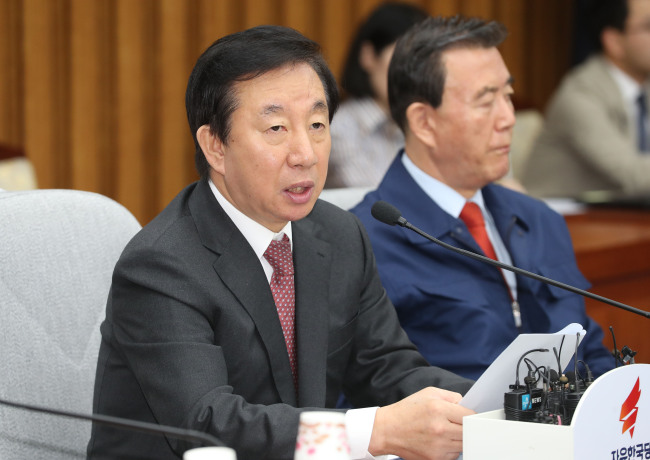South Korea‘s political parties showed mixed responses to North Korean leader Kim Jong-un’s summit with Chinese President Xi Jinping.
The ruling Democratic Party of Korea said it believes the summit “created an opportunity that would help find a peaceful resolution to the North’s nuclear issue through dialogue.”
“The more North Korea comes out to the diplomatic stage, the easier it will be to solve problems of the Korean Peninsula,” the party’s spokesperson Kim Hyun said in a statement Wednesday.
“Continued diplomatic dialogue and meetings between leaders would help solve the North’s nuclear issue and build peace on the Korean Peninsula.”
Noting that efforts by all neighboring countries are necessary for lasting peace on the peninsula, Kim said the Democratic Party expects the summit between Kim and Xi to have a positive effect on the inter-Korean summit in April.
 |
Kim Sung-tae, the floor leader of the main opposition Liberty Korea Party, speaks during a party meeting at the National Assembly in Seoul on Wednesday. (Yonhap) |
Democratic Party floor leader Woo Won-shik said Kim’s surprise visit to China marked a sudden twist in the two countries’ relations as Pyongyang tries to raise its bargaining power in the upcoming summit with Washington, and Beijing seeks to regain the initiative on issues concerning the Korean Peninsula.
The main opposition Liberty Korea Party leader Hong Joon-pyo said, however, that North Korea was now playing China after playing South Korea and the US with nuclear weapons.
“The Moon Jae-in administration, which doesn’t even have a license, put Kim Jong-un behind the steering wheel and is claiming they are driving the car when they are just watching the nuclear weapon show from the back seat,” Hong wrote in a Facebook post, criticizing Moon’s idea that Seoul would take the driving seat in handling the security issues of the Korean Peninsula.
“The Moon administration’s inter-Korean peace charade, which has loosened South Korea’s alliance with the US and made China walk away from international sanctions, reminds me of Chamberlain’s Munich Agreement in September 1938.”
Liberty Korea Party spokesman Hong Ji-man said the intentions behind US President Donald Trump’s recent appointment of hard-liner John Bolton as his national security adviser and the summit between Kim and Xi make it hard to anticipate any major steps toward denuclearization in the upcoming summits.
“We are concerned about the possibility that North Korea might join hands with China to run out the clock. This will no doubt exacerbate the situation,” Hong said in a statement.
The minor opposition centrist Bareun Mirae Party called on the government to “dismiss its rosy outlook” for the inter-Korean summit and build a meticulous strategy to denuclearize the North.
“China, which holds the key to sanctions against Pyongyang, still maintains a strategy of using the North as leverage for its security and national interests in Northeast Asia,” the party’s co-chair Park Joo-sun said, adding that Seoul needs a meticulous strategy at this time of Chinese intervention.
Yoo Seong-min, the other co-chair of the party, said the purpose of Kim’s visit to China appears to be moving Beijing to weaken the sanctions and pressure against his country.
“If China alleviates sanctions and pressure, it will be harder to reach the goal of denuclearization,” Yoo said.
Liberal minor opposition Party for Democracy and Peace spokesman Choi Gyung-hwan said Seoul’s sending of special envoys to the US, Japan, China and Russia, and the North’s summit with China show that the two Koreas are on their way to “an appropriate and positive road map” for denuclearization.
By Kim So-hyun (
sophie@heraldcorp.com)








![[Today’s K-pop] Blackpink’s Jennie, Lisa invited to Coachella as solo acts](http://res.heraldm.com/phpwas/restmb_idxmake.php?idx=644&simg=/content/image/2024/11/21/20241121050099_0.jpg)